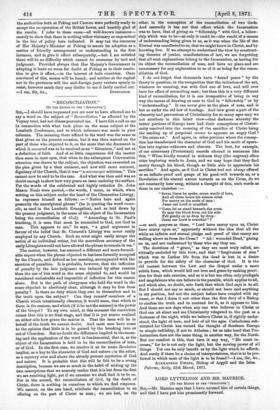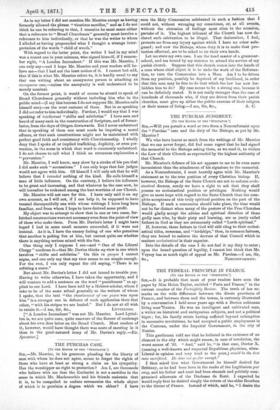LORD LYTTELTON AND MR. MAURICE. [TO THE EDITOR OF THE
"SPECTATOR."]
Sin,—Mr. Maurice says that I have accused him of certain things, and that I have put him prominently forward. As in my letter I did not mention Mr. Maurice except as having formerly allowed the phrase "vicarious sacrifice," and as I do not think he can be referring to that, I conceive he must mean either that a reference to " Broad Churchmen" generally must involve a reference to him individually, or that he was the writer to whom I alluded as having propounded what I thought a strange inter- pretation of the words " child of wrath."
With regard to the latter point, the writer I had in my mind was a recent one in your columns, who signed himself, if I remem- ber right, "A London Incumbent." If this was Mr. Maurice, I can only say—and I hope Mr. Maurice and your readers will be- lieve me—that I had not the least notion of it. I cannot but add, that if this is what Mr. Maurice refers to, it is hardly usual to say that one writing about an anonymous person is attacking an anonymous one,—unless the anonymity is well understood to be merely nominal.
On the former point, it would of course be absurd to speak of Broad Churchmen generally without including him who in the public mind—(I say this because I do not suppose Mr. Maurice calls himself one)—as the most eminent of them. But in so speaking I did not refer to him individually. Further, I would say that I was speaking of intellectual " shifts and subtleties." I have seen and heard of many such in the construction of Scripture, and of formu- laries, from the days of Origen downwards. But I never understood that in speaking of them one must needs be imputing a moral offence, or that such constructions might not be maintained with perfect good faith and consistency with Churchmanship. I wholly deny that I spoke of or implied trafficking, duplicity, or even per- version, in the sense in which that word is commonly understood. I do not choose to call what I think an erroneous explanation a " perversion."
Mr. Maurice, I well know, may show by a stroke of his pen that I did make such " accusations." I can only hope that fair judges would not agree with him. Of himself I will only ask that he will believe that I intended nothing of the kind. He calls himself a man of little influence. On the contrary, I believe his influence to be great and increasing, and that whatever be the case now, he will hereafter be reckoned among the best worthies of our Church.
Mr. Maurice will not care for this. I have only said it on my own account, as I will not, if I can help it, be supposed to have treated disrespectfully one with whose writings I have long been familiar, and from whom I hope to have derived some profit.
My object was to attempt to show that in one or two cases, far- fetched constructions were not necessary even from the point of view of those who make them. From Mr. Davies's letter I might have hoped I had in some small measure succeeded, if it were not ironical. As it is, I have the uneasy feeling of one who perceives that another is poking fun at him, but cannot quite see whether there is anything serious mixed with the fun.
One thing only I suppose I see—and " One of the Liberal Clergy " confirms it—that Mr. Davies thinks my view is one which involves " shifts and subtleties." On this to quoque I cannot argue, and can only say that my view seems to me simple enough. For the rest, I can only repeat the old saying, " There is no refuting a sneer."
But about Mr. Davies's letter I did not intend to trouble you. Having to write otherwise, I have taken the opportunity, and I will venture to add a sentence on the word " punishment " as ap- plied to our Lord. I have been told by a Hebrew scholar, whom I take to be of the same school generally as the writers of whom I spoke, that the text "the chastisement of our peace was upon him " is a stronger one in defence of such application than that other, "with his stripes we are healed." But I do not at all wish
[" A London Incumbent" was not Mr. Maurice. Lord Lyttel- ton is, we are quite sure, quite unaware of the flavour of contempt about his own first letter on the Broad Church. Most readers of it, however, would have thought there was more of sneering in it than in the good-natured irony of Mr. Davies's reply.—ED. Spectator.]



































 Previous page
Previous page